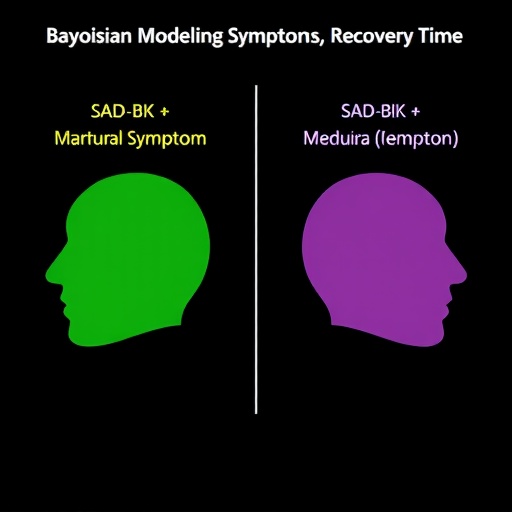In a groundbreaking study emerging from Jimma University Medical Center in Ethiopia, researchers have illuminated the intricate relationship between the symptom burden of bipolar disorder and the duration until symptomatic recovery. Utilizing advanced Bayesian joint modeling, this research bridges longitudinal patient symptom tracking with survival analysis, offering profound insights into how early symptom severity predicts recovery timelines in bipolar disorder patients.
Bipolar disorder, a complex psychiatric condition typified by mood swings ranging from extreme irritability to profound depressive episodes, challenges clinicians due to the variability in symptom presentation and clinical course. This newly published work delves deeply into the dynamic symptom patterns over time, connecting them with survival data that captures the time to symptomatic recovery. By doing so, the study transcends traditional methods that often isolate longitudinal symptom trajectories from event-time outcomes.
The cohort under scrutiny consisted of 257 patients diagnosed with bipolar disorder who were admitted and followed longitudinally between September 2018 and January 2020. Of these patients, nearly half, approximately 45.1%, experienced symptomatic recovery during the study period. The integrative Bayesian framework allowed for the simultaneous modeling of symptom burden, assessed repeatedly over time, and the time until recovery, yielding more robust and interpretable associations than separate models would permit.
Central to the investigation is the employment of Bayesian joint models, which adeptly handle the complexities of longitudinal count data alongside survival data. This statistical innovation permits the accommodation of shared random effects, capturing unobserved heterogeneity between patients. Notably, the shared random intercepts indicated a significant negative correlation between baseline symptom burden and time to symptomatic recovery. This implies that patients presenting with a higher initial burden of symptoms tend to experience prolonged recovery periods.
Beyond baseline symptom severity, the study identified multiple covariates influencing both symptom trajectory and recovery. Variables such as age at onset, interaction between follow-up time and adolescent onset, episodes of relapse, coexistence of other cofactors, and substance use—including the culturally specific factor of khat chewing—demonstrated significant impacts on symptom burden dynamics. Moreover, demographic factors like marital status and clinical episode types were significant predictors within the survival models that estimate time to recovery.
Delving into the temporal dynamics of symptoms, the interaction effects highlighted in this research reveal the non-linear and patient-specific progression of bipolar manifestations. For instance, the exacerbation of symptoms following relapse events and their modulation by substance abuse points toward important clinical considerations. These nuanced findings underscore the necessity for tailored interventions that account for individual patient histories and comorbid risk factors to optimize recovery trajectories.
The implications of this study extend beyond academic interest, presenting crucial avenues for clinical practice. The demonstration of a robust negative association between initial symptom burden and recovery time signals to healthcare professionals the urgency of early, intensive intervention, especially for those presenting with severe symptoms at baseline. This could translate into personalized treatment plans emphasizing symptom reduction at the earliest stages to truncate prolonged illness episodes.
By leveraging Bayesian methods, the authors have set a methodological precedent in psychiatric research. The joint modeling approach not only provides more precise estimations but also integrates different modalities of patient data coherently, enabling a more holistic understanding of bipolar disorder’s clinical course. This statistical paradigm can be adapted for other psychiatric and chronic illnesses where symptom evolution and event timings are intertwined.
Furthermore, the study’s setting in Jimma University Medical Center enhances its relevance by addressing bipolar disorder within a sub-Saharan African context, where sociodemographic and cultural factors like the prevalent use of khat—an amphetamine-like stimulant—may uniquely influence disease progression. Such contextualization lends vital insights into region-specific determinants of mental health outcomes often underrepresented in global psychiatric literature.
In summary, this investigation meticulously harnesses retrospective longitudinal symptom measurements and survival analysis through a Bayesian lens, unveiling pivotal links between symptom burden and recovery timing. The findings advocate for enhanced clinical attention to initial symptom severity and its trajectory, which dictate patient prognosis in bipolar disorder.
Looking forward, these results prompt urgent consideration for mental health policies and resource allocation focused on early detection and personalized treatment strategies. If harnessed efficiently, this knowledge could revolutionize management paradigms for bipolar disorder, ultimately improving quality of life and functional recovery for countless individuals impacted by this debilitating condition.
Such pioneering research at the intersection of advanced statistical modeling and psychiatric epidemiology sets a new benchmark, demonstrating how complex data can be synergistically utilized to unravel the multifaceted nature of mood disorders. As data capabilities expand globally, the integration of longitudinal and survival analyses within a Bayesian framework may become a standard in personalized psychiatric care.
The study, authored by Kulute, Akessa, and Kifle, is slated for publication in the reputable journal BMC Psychiatry (Volume 25, Article 337, 2025), representing a significant contribution to the mental health research landscape. It offers an exemplary model of how interdisciplinary approaches combining statistical innovation and clinical insight can yield impactful advances against prevalent psychiatric disorders.
Subject of Research: Bipolar disorder symptom burden and its association with time to symptomatic recovery using Bayesian joint longitudinal and survival modeling.
Article Title: Bayesian joint longitudinal and survival modeling of bipolar symptom burden and time to symptomatic recovery of patients with bipolar disorder at Jimma University Medical Center, Jimma, Ethiopia.
Article References:
Kulute, T.F., Akessa, G.M. & Kifle, D. Bayesian joint longitudinal and survival modeling of bipolar symptom burden and time to symptomatic recovery of patients with bipolar disorder at Jimma University Medical Center, Jimma, Ethiopia. BMC Psychiatry 25, 337 (2025). https://doi.org/10.1186/s12888-025-06776-6
Image Credits: AI Generated




